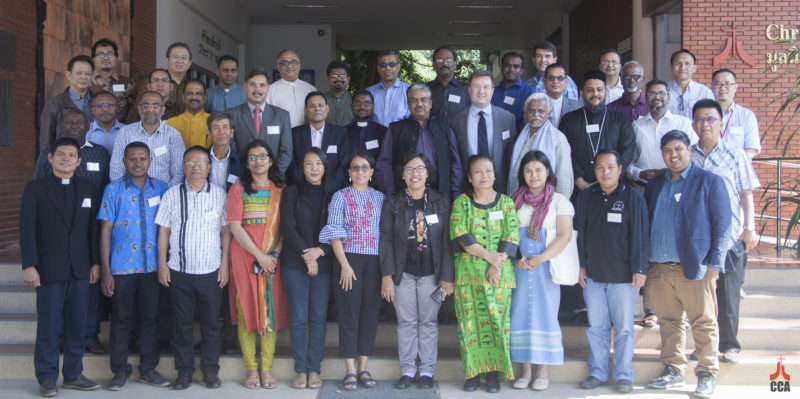Ecumenical Diakonia must prioritise its agenda in responding to emerging issues and be prophetic, transformative, and justice-seeking

CHIANG MAI, Thailand: A refresher training for diaconal mission agencies of churches and related organisations facilitated jointly by the Christian Conference of Asia (CCA) and the World Council of Churches (WCC) focused on the churches’ participation and mission in prophetic diakonia within the Asian context.
A coherent and coordinated approach to churches’ engagement in prophetic diakonia was addressed in the various sessions of the training, which was attended by 41 participants from across CCA and WCC Asian member churches, as well as those from specialised ecumenical diaconal agencies in Asia.
The training was held at the headquarters of the CCA in Chiang Mai, Thailand from 5 to 8 December 2019.
Dr Mathews George Chunakara, the General Secretary of the CCA in his thematic address outlined the metamorphosis of the ecumenical perspectives on diakonia. He stated, “The challenge of diakonia as emphasized by the ecumenical movement through WCC’s facilitation has always been to encourage diakonia to move from a charity-model approach to justice, and leap over national and ecumenical frontiers to respond to local and global issues; to partner in god’s mission, and be prophetic, transformative, and justice-seeking.”
The CCA General Secretary critiqued the lost vision of the ecumenical movement in the area of equipping churches, whether small or big, in successfully fulfilling the mission and vision for diakonia and development, for which the churches must have adequate trained leadership.
“In Asia’s diverse contexts where there is a widening of economic and social disparities, where there is a reduction in the sustainability of economic growth, and where the fragility of ecological balance is further accentuated, churches need to be equipped in the real witness of diakonia, and must cover a wide spectrum of engagement: from advocacy, care for the marginalized, participation and solidarity in struggles for justice, responsible stewardship of creation, and keeping hope alive in the heart of the community,” said Dr Mathews George Chunakara.
In his presentation on ‘The Sustainable Development Goals (SDG)’, Rev Matthew Ross, Programme Executive for Diakonia and Capacity Building in the WCC, highlighted Sustainable Development Goals 8 and 9 that relate to ‘Decent work and economic growth’ and ‘Industry, Innovation, and Infrastructure’.
Rev Ross admitted, “The relationship between churches and ecumenical development agencies continues to evolve and has not always been an easy relationship; however, the shared priorities for the value and dignity of human beings forces us to work for the betterment of humankind and care of the earth.”
Rev Ross observed that ‘there is much to learn from the unique Asian experiences and expressions of diakonia and it is the duty of the churches in Asia to share their best practices with the rest of the world’.
Uplifting that diakonia is not just a department of the church but the very basis of why it exists, Rev Asir Ebenezer, General Secretary of the National Council of Churches in India, in his presentation on ‘Diakonia as the Mission of the Church’ elaborated, “Diakonia is that which adds to the value and message of mission. The images of the church as salt, light, vinedresser, and gardener capture this diaconal task of the church.”
Specific issues in ‘Church’s Diakonal Ministry’ such as that of ‘Health and Healing’ and of ‘Women and Children’ were presented by three panelists- Rev Debora Purada Sinaga of Huria Kristen Batak Protestan (HKBP), Rev Juliet S Aguilar of United Church of Christ in the Philippines (UCCP), and Dr Ronald Lalthanmawia, Program Coordinator, Prophetic Diakonia and Advocacy, CCA.
Various leadership models from both biblical and management perspectives were presented by Rev Abraham Varkey of the Christian Agency for Rural Development (CARD) in India.
Stories of change from different diaconal contexts emphasizing ‘People’s Participation in Development’ were shared by diaconal mission agencies of three member churches of CCA and WCC in Asia by the Social Health and Education Development (SHED) Board of the Bangladesh Baptist Church, CARD of the Malankara Mar Thoma Syrian Church in India, and the Social Empowerment Vision in Action wing (SEVA) of the Church of South India.
Sessions on Organizational Management and Human Resource Management anchored by the Christian Institute of Management (CIM) strengthened the participants' perspective on this topic.
The participants worked out holistic strategies for human resource development in their respective churches and related agencies. They identified key issues related to SDGs that CCA and WCC member churches and their diaconal missions can effectively respond to.
The training aimed at helping participants to contextualise the role of the Church in working towards SDGs in ecumenical engagements as well as aided in creating a network for future exchange of resources and encouraging cross-learning of best practices in ecumenical diaconal engagements.










